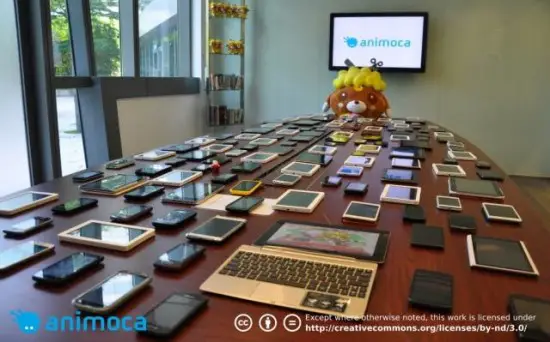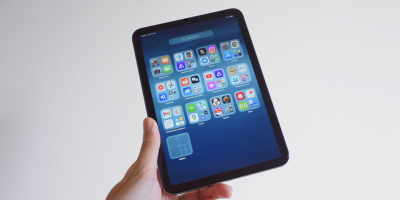This particular image by popular app developer Animoca has done the rounds of world wide web this past week, used by several blogs as yet another “proof” of Android’s fragmentation. Even Chris wrote it about it yesterday. The Hong Kong-based developer says they have over 400 test devices to ensure their apps will be compatible with anything their work is put on.
Damning? Hardly. Android is fragmented, it was always intended to be, and therein lies the beauty of the platform. Everything from TVs to watches run on Android currently. What Android does exceptionally well is that it allows manufacturers to produce any device they wish, without any restriction, so as to offer users as many choices as possible. And it also does well to allow developers to target as many varying form factors with the same code.
The focus on that last sentence should be on the word quality. And what I mean by that is a developer who understands the platform, acknowledges the constraints fragmentation puts on it, and strategizes development accordingly. It might be more difficult to develop for Android than other platforms (though, personally, I found it easier because of my previous experience with Java) but with the slightest of research, you know when you first start what you’re getting yourself into. And, anyway, other than apps that have specific hardware-platform requirements, developing for Android is far easier than web-development.
Also, Animoca goes on to mention that one of their biggest problems is the throngs of entry-level phones available in China. This is a problem specific to a few regions (primarily developing countries, such as India too). And it’s a good thing these phones are available, because they have brought down the price of smartphones to such a degree that nearly everyone can now afford to skip feature phones, and get an Android device (even if of highly limited capabilities).
This is a good thing not only for Android, not only for developers, but the entire smartphone industry in the long run. Also, I have to give props to Animoco for having understood the purpose of fragmentation in Android by not cribbing about it, but instead saying:
“We like fragmentation as users prefer choice. We are not big believers that one size fits all.”
As I wrote back in February, there’s not much Google can now do to turn this fragmentation and other side-effects that come along with an open-source system. So everyone, please, skip this pointless hoopla around “fragmentation”.
It isn’t a bug, it’s a feature.









I think this image is leading lots of iSheep to incorrectly assume that this is 100% necessary when developing for Android. The truth is, an app SHOULD theoretically work on any device running the version of Android it was designed for, and if not, that is why you can email the developer or report bugs in Android.
Come on people, think about the situation before you jump to the conclusion that this picture means Android is terribad.
Unfortunately that argument means very little when 95% of those devices are still on Android 2.x and have terrible build quality.
I love Android but the argument goes both ways.
There is no Android fragmentation! Don’t spread FUD!
“We are not big believers that one size fits all”
Exactly. Whether you use Android, Windows Phone, Blackberry, iOS, whatever. There is no winner. It’s preference. Do you like it? Yes. Does it meet your needs? Yes. Then you found the phone for you.
Android has been my phone’s OS since the G1 and I haven’t looked back. Love ‘fragmentation’!
Well this isn’t coming from the point of view of a user. Developers are the ones who have to work their butts off to make sure their software works on your particular device.
A ridiculous article. Poor understanding of industry.
If that argument were to be applied to the automotive industry, there would only be volkswagen beetles.
Or to the desktop and laptop business. There would only be one laptop with 3 memory configurations.
Or to races… only one race would be allowed.
We are different, this is a developing industry, much as other industries develop, there is fierce competition that spurs development.
Yes you can call variety and option, fragmentation, but you would appear foolish.
At what point have I said choices should be limited? If anything I’ve said that the current state of Android is what it should be:
“Android is fragmented, it was always intended to be, and therein lies the beauty of the platform. Everything from TVs to watches run on Android currently. What Android does exceptionally well is that it allows manufacturers to produce any device they wish, without any restriction, so as to offer users as many choices as possible.”
I think you have a poor understanding of the article, if anything he was saying the opposite.
Are you high on drugs?
This article clearly supports fragmentation.
This is not what fragmentation is, fragmentation is how many versions of the Android software is running at one time. Different models and resolutions is a feature.
Just like different screen resolutions and hardware on PC’s isn’t considered fragmentation, they are still all running the same operating system.
Fragmentation exists in all software, like with windows where people are running different versions of windows, and even the non “fragmentation” golden boy apple in their PC market, where updates aren’t free.
The difference in these analogies is android manufacturers make heavy skins that sit on top of Android and slow down updates, that is an issue which I think should be addressed, but pointing out 400 different models of Androids is not a representation of Android fragmentation.
Thank you John, I’m glad you said it cause I was thinking the same thing. This is not fragmentation, more like options. I LOVE ANDROID!
lol you are so dumb.
400 models is great, but it’s not even half of all the Android devices.
This is a direct quote listed on one of my applications (which supports basically everything with a touchscreen and Android 2.1+)
“This application is available to over 1285 devices.”
Isn’t Android great?!
$5 To whoever accurately labels all those
If I were a developer, I would look at that table and think how far reaching my product can be. If I were a really good developer, I would look at that table and say to myself, “The world is mine, all mine!”
Wow….I’m dizzy from all of the spin
The
competition among Android makers is, in my opinion, a good thing. It
ensures competition in a profitable market, giving the customer a wide
choice in Android gadgets to buy. Also, the competition allows for
makers (like Samsung, HTC, Sony, etc) to create more advanced phones to
“up their game” and make their gadget to stand out, not only in looks,
but in hardware and software.
Although this gives a more fragmented
Android market to work with, this can easily be fixed by Google
creating standards of what elements of software and hardware to put in
each gadget. That way, is the app works with the standard, it’ll work
with everything else…
Just my two cents…
I still think that Android would have better quality apps if it wasn’t for fragmentation.
However, the platform might not have grown as fast. Which means it might not be as tempting to developers as it is right now which further means we might not have had better quality apps if it wasn’t for fragmentation.
Main point is, we don’t know how things have turned out, but fragmentation carries its own advantages and disadvantages. The platform was designed from the beginning to be fragmented, and as such there’s no real point for people to point to it as valid criticism.
LOL its so tempting yet all major apps/games still have an iOS version first, and Android comes after? SOOOO TEMPTING BRO
Fragmentation is primarily OS related and not hardware. The os itself and the styling of the software negates most of the hardware differentiation like resolution.
Fragmentation is not an issue for seasoned developers. I having dealt with it for the last 20 years. Your tools can simulate devices and your automated tests will find those little differences. Its part of the job.
I find that those who complain about it are the ones lacking discipline as a a dev or just don’t understand it. Fragmentation is in every aspect of life. It gets dealt with. pros don’t cry about it.
My biggest concern is the difficulty of upgrading the OS. For testing my apps on different devices and OS I use http://www.thebetafamily.com nothing can beat real testers and I cant afford to own all the different devices myself :P
The hardware diversity is great, by OS fragmentation — http://developer.android.com/resources/dashboard/platform-versions.html — is potentially a real challenge for developers. Now 4.0 has matured, I believe a slower OS release schedule would make sense.
I couldn’t agree more. It is easy to develop for Android and 99% of the code you write will work on all the devices with that version or higher. The other 1% isn’t hard to take care of.
Your numbers are wrong. And you’re an idiot.
Yea, we all know “One size does not fit all”!
http://media.peopleofwalmart.com/wp-content/uploads/2012/05/3828.jpg
Anyone interested in turning the fragmentation dilemma upside down in their work environment may be interested in viewing a webinar held by Fiberlink last week, Android in the Enterprise: Piecing Together Fragmentation.
Here’s the recap just to get started: http://bit.ly/JTO5g7